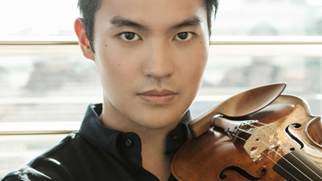|
Back
Orchestre symphonique de Montréal Captivates with Rachmaninoff Montreal
Maison symphonique de Montréal, Place des Arts
09/17/2015 - & September 19, 2015
Krzysztof Penderecki: Symphony No. 3: Adagio (string version, excerpt) (*)
Jean Sibelius: Violin Concerto in D Minor, Op. 47
Sergei Rachmaninoff: Symphony No. 2 in E Minor, Op. 27
Ray Chen (Violin)
Orchestre symphonique de Montréal, Krzysztof Penderecki (*), Yan Pascal Tortelier (Conductors)

R. Chen (© Julian Hargreaves)
The Orchestre symphonique de Montréal’s second subscription program of its 82nd season featured a stunning performance of Rachmaninoff’s Second Symphony. This made up for the OSM’s season opener last week of Debussy’s Pelléas et Mélisande in concert, which I did not attend. Claude Gingras, the dean of local music critics, called the performance he heard “interminable”. The Rachmaninoff was anything but. Its success was due largely to guest French conductor Yan Pascal Tortelier. Despite the jaunty pacing, Tortelier delivered a well-shaped, unified performance whose architectural line and rhythmic pulse never flagged. The excitement throughout was palpable. It was a joy to see a conductor engage an orchestra with unwavering passion and intensity. The playing was flawless. Lush, burnished sound; haunting, heartfelt solos; carefully modulated dynamics; myriad colors; and an assured, confident beat. Not a whiff of Romantic indulgence or melodrama. Todd Cope deserves a special nod for his enchanting third movement clarinet solo, one of the most glorious melodies in the symphonic repertory.
The program opened with two disagreeable surprises. Krzysztof Penderecki was invited to conduct the Adagio from his Third Symphony. (A shame to have brought him all the way from Poland and not conduct the entire work.) At the last minute, however, it was announced that the composer would conduct a string version – mildly disappointing as we had been expecting a full orchestra. Dressed in a business suit (which clashed with the sea of tails before him) and conducting from his score, Penderecki drew from the orchestra a well-sculpted sound with glorious color and depth. A unified tone and smooth solos from the principal string players characterized the first seven minutes of the work. But at that point, as I was wondering where it could go next, the music unexpectedly stopped. This was the second surprise. The Adagio movement normally runs to 14 minutes! Just seven minutes of Penderecki. This orchestra must have money to burn!
Between these two works, the twentyish-something Ray Chen (substituting for Hilary Hahn who is expecting a baby) played the Sibelius Violin Concerto – a dubious choice as he performed it at his last and debut appearance with the Orchestra just three years ago. Chen displayed excellent technique; a pure, clean line in the slower passages and a judicious use of vibrato. Some of the faster, more dramatic passages, however, verged on being labored (particularly in the first movement cadenza); a little more finesse and attention to dynamics would bring more expressiveness and depth to his playing. For his encore he gave a winning rendition of Paganini’s Caprice Number 21.
Earl Arthur Love
|